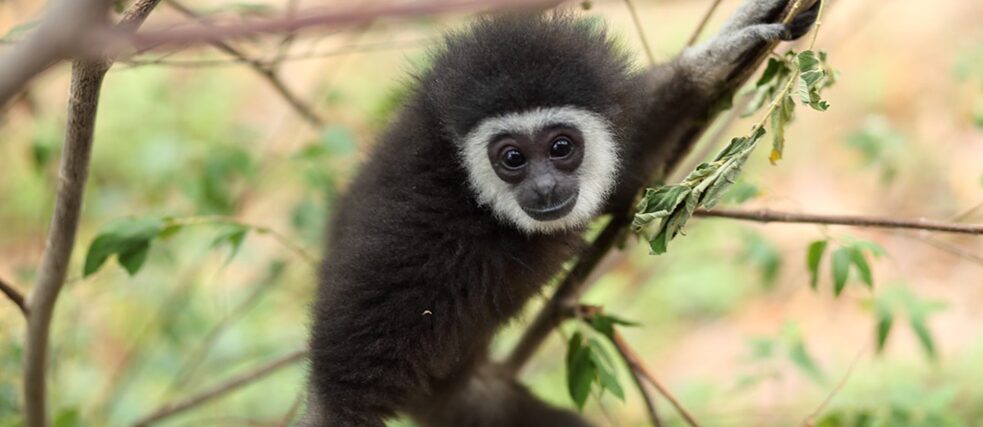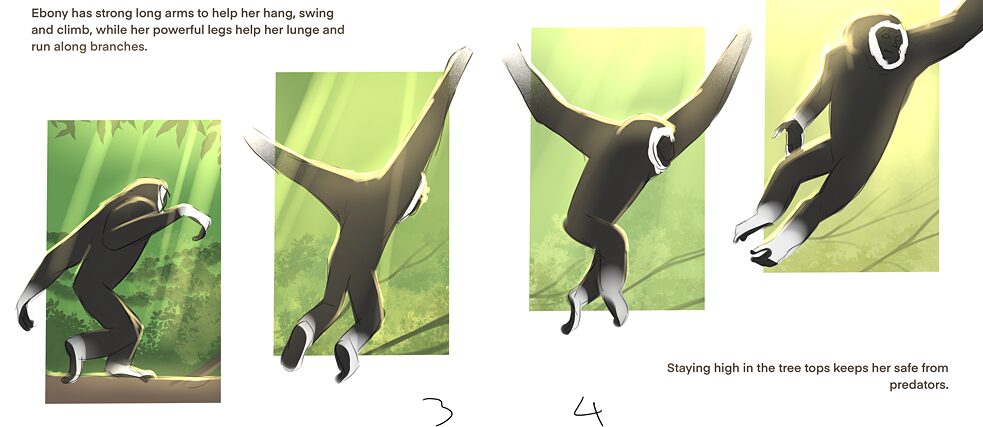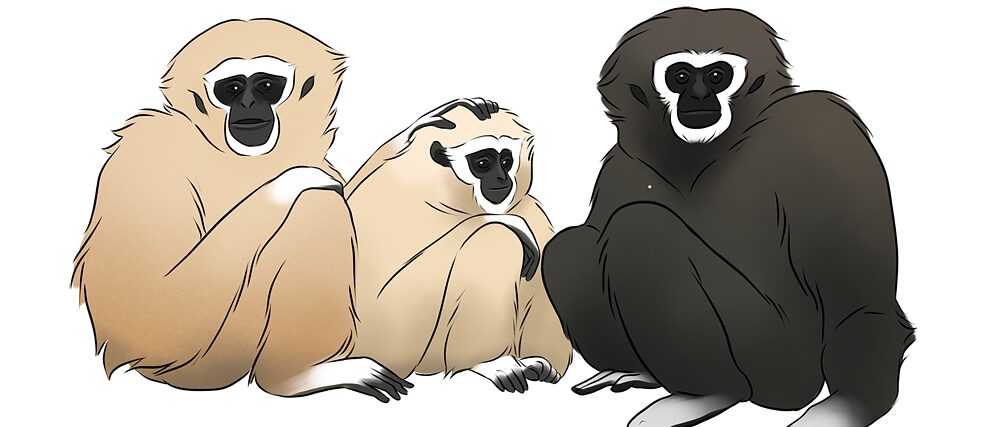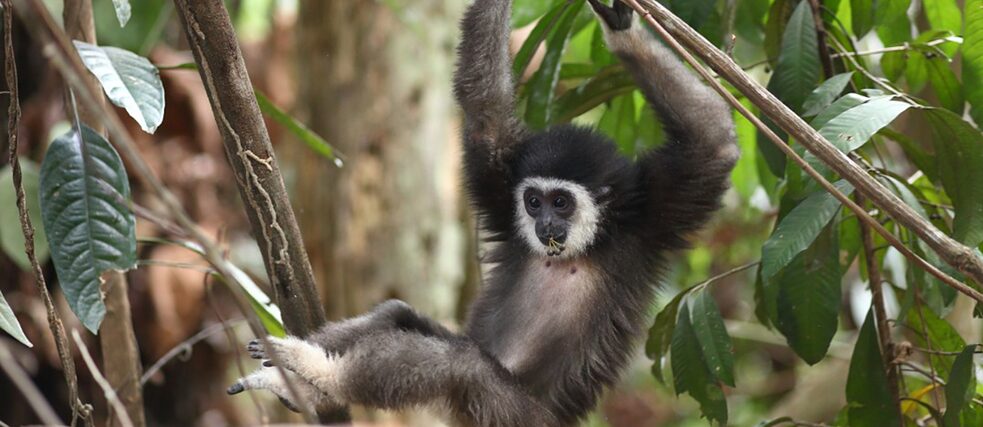Ecocentric Transitions, Sungai Buloh, Malaysia
A Little Gibbon Is Set Free
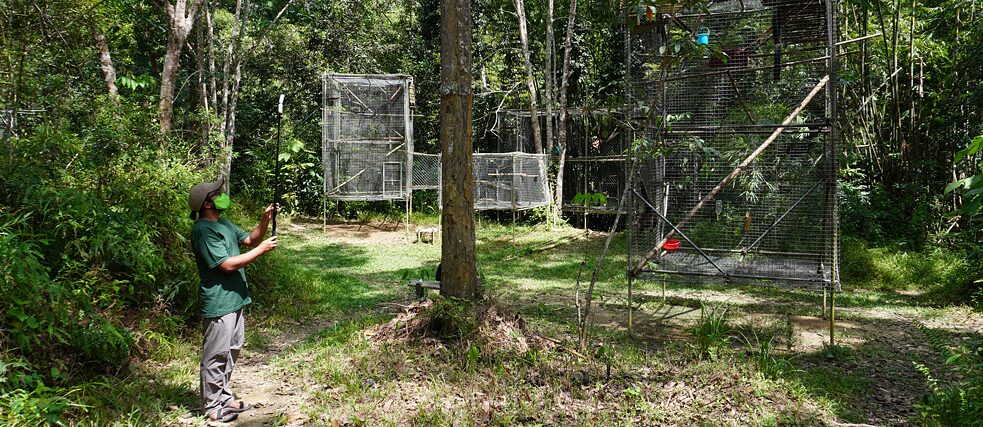
The picture book Ebony Sticks Out Her Tongue tells the story of a little gibbon that is freed from captivity and reintroduced to life in the wild. With this children’s book, the organisation Ecocentric Transitions addresses the issue of wildlife trafficking and raises awareness about the importance of rehabilitation training for animals and the conservation of Malaysian forests.
By Nisha, Ecocentric Transitions
“Ebony sticks out her tongue” is an illustrated children’s book about a juvenile Gibbon who is a victim of the wildlife pet trade. The book gives us a glimpse of Ebony’s journey from the tropical Malaysian forest where she lived with her family in the tree tops to being sold as a pet under dangerous conditions. We get a glimpse of Ebony’s life as a pet which ended with her being traumatically locked away alone for more than a year before being rescued.
We follow Ebony’s journey at the rehabilitation center as she develops various critical life skills which span from climbing high up into tree tops, eating forest browse, developing her instincts for problem solving, singing Gibbon songs, finding a compatible play mate who becomes her surrogate sister and grooming buddy. This story shares the good work done by the Gibbon Conservation Society’s (GCS) Gibbon Rehabilitation Project (GReP) since 2015 in line with providing enrichment activities that assist gibbons in their care to achieve all the milestones and critical-release-criteria set by the International Union for Conservation of Nature (IUCN) for soft release to the wild.
The Reality beyond Ebony's Story
In the long journey of protecting wild Gibbons in Malaysia the Gibbon Protection Society is dedicated to rescuing Gibbons from the wildlife pet trade. Whole Gibbon families are killed by poachers to retrieve baby Gibbons, this trauma inflicted on the young Gibbons compound with time as the young Gibbons live as a pet. Some when recovered by the team are badly abused or have been self-abusing for long periods of time. Although physical wounds heal with care, mental and social trauma are lifelong.
At the IUCN accredited GCS rehabilitation center known as GReP, the team challenges the Gibbons to unlearn many behaviors learnt as pets like eating human food, spending time on the ground and in some cases wearing clothes.
Rehabilitation seeks to expose and condition the Gibbons for life in the wild, this includes learning to forage for food, social behavior from grooming to singing, problem solving and physical health. The process of rehabilitation may take many years and possibly extend a decade for each individual to meet the release criteria.
The Work of Ecocentric Transitions and the Motivation for the Book Project
We at Ecocentric have been very involved and in collaboration with many conservation groups and animal specific researchers as part of our environmental education journey. We believe there are many opportunities to amplify the work of experts on the ground through science communication and social marketing.
This project is a symbol of our commitment to raising awareness on the impact of deforestation, wildlife pet trade and to protest the laws where rehabilitation centers are not recognized in peninsular Malaysia. We hope through this work we get to support wildlife rehabilitation and to encourage the growth of wildlife rehabilitation profession.
“This journey has been a rollercoaster of optimism, anger, frustration and gratefulness – through this I learnt more about humanity than about gibbons.“
Nisha, Ecocentric Transitions, Malaysia
This book is a part of our RIMBA-The Card Game education on biodiversity. We believe raising empathy and knowledge about Fauna, Flora and ecosystems are very important in preserving our unique natural heritage. We would like to develop content that provides insights to being a responsible society.
With the funding of the International Relief Fund we could pay time and effort of a dedicated production team that covers end to end editorial and publication cost. Many of this costs if not dedicated specifically through this grant would result in a long stretched out delivery or in the worst case this book may never be published.
This fund is enabling us to mainstream wildlife rehabilitation and the dark nature of wildlife trade among young people and Malaysians at large. By default, this book project has connected us to many different creative individuals who have shared their skills and insights allowing us to effectively communicate through writing, visuals and the use of media. We aim to foster deeper engagement and discussions during the marketing phase through readings and interviews. Our long-term goal is to influence professionalism in wildlife rehabilitation and care.
We hope young people reading this book about Ebony's life will develop a deep connection to wildlife and the forest, in extension influence behavior change towards wildlife as pets.
Nisha, co-founder of Ecocentric Transitions and writer of "Laila sticks out her tongue"
works as a sustainability facilitator and her work focusses around curating content, programming activation engagements around environmental empathy and behaviour change for young people and community groups. Inspired by people, gamification, science communications and the love for wildlife she actively seeks out projects that allow for disruptive innovations for community engaged conservation.
Arvin, the Illustrator, is a 4th year Veterinary student from University Putra Malaysia and passionate about animals and drawing. Inspired by digital art and the immediate translation of his thoughts from idea to coloured and textured images, he has expanded his hobby to draw gibbon images for fundraising merchandise and awareness via social media.
